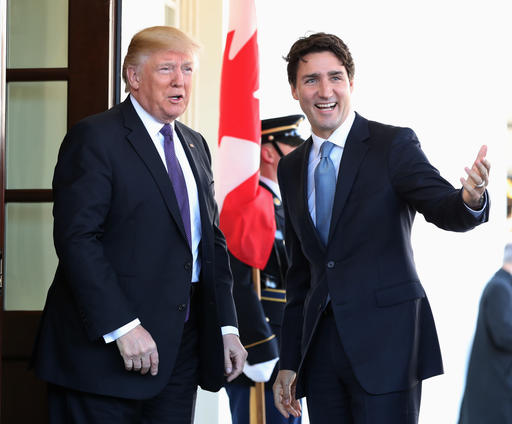
President Donald Trump greets Canadian Prime Minister Justin Trudeau upon his arrival at the White House in Washington, Monday, Feb. 13, 2017. AP Photo
WASHINGTON— A political odd couple, President Donald Trump and Canadian Prime Minister Justin Trudeau resolutely played up their similarities at their first meeting Monday, even as obvious differences lurked behind their public smiles.
After their White House meeting, the North American neighbors emerged to hail their close ties, with Trump promising to “build upon our very historic friendship” and Trudeau noting the “special” bond between the countries.
But it was hard to escape their contrasting worldviews.
Speaking to reporters, Trump defended his restrictive refugee and immigration orders, saying that “we cannot let the wrong people in.” Trudeau, on the other hand, said Canada continues to “pursue our policies of openness.”
READ: Canada’s Trudeau welcomes all immigrants in sunny Twitter message
Trudeau later acknowledged that there are times when the two countries differ. But he said, “The last thing Canadians expect is for me to come down and lecture another country on how they chose to govern themselves.”
During their post-meeting news conference, the reporters Trump called on did not ask about two pressing issues of the day — the future of embattled National Security Adviser Michael Flynn and North Korea’s reported ballistic missile launch.
The stakes for Trudeau in his Washington visit are high: He is seeking to ensure Canada is not crippled as Trump re-negotiates the North American Free Trade Agreement. And he got much of what he was looking for. Trump praised the “outstanding” trade relationship between the United States and Canada and said he would only be “tweaking” it going forward.
“We’ll be doing certain things that are going to benefit both of our countries. It’s a much less severe situation than what’s taking place on the southern border,” said Trump, who has been strongly critical of America’s trade situation with Mexico.
Trade relations with the U.S. are crucial to Canada as more than 75 percent of Canada’s exports and 98 percent of its oil exports go to the U.S., while 18 percent of American exports go to Canada.
Monday’s meeting was billed as one the most important for a Canadian leader with a U.S. president in decades because of Canada’s heavy reliance on its southern neighbor.
Trump greeted Trudeau with a firm handshake as the Canadian arrived at the White House on a blustery morning. The two posed silently before reporters, until Trump suggested they shake hands for the cameras. Trudeau did bring a personal gift — a photo of Trump with Trudeau’s father, the late Canadian Prime Minister Pierre Trudeau.
Justin Trudeau, age 45, and Trump, age 70, have vastly different outlooks on the world.
Trudeau is a liberal who champions free trade and has welcomed 40,000 Syrian refugees. He calls himself a feminist and women make up half his Cabinet.
Trump has few women in his Cabinet. He has taken a protectionist stance on trade and wants to crack down on the inflow of migrants and refugees. His order to temporarily halt entry into the U.S. by people from seven predominantly Muslim nations is currently tied up in court.
Trump already has been good for Canada as he has said he’ll expedite approval of the Keystone XL pipeline. The pipeline from Alberta through America’s midsection would carry more than one-fifth of the oil Canada exports to the United States. Former President Barack Obama turned down the pipeline, a major blow Canada’s oil industry.
Canada has the third largest known oil reserves in the world and needs infrastructure to export its growing oil sands production. The country is America’s largest supplier of foreign oil.
In addition to private meetings, the leaders held a roundtable discussion with female executives from the U.S. and Canada and announced a task force focused on women in the workforce.
Trump’s daughter Ivanka Trump was in attendance at the meeting and helped recruit participants and set the agenda, fresh evidence of her policy influence.
Said Trump: “In order to create economic growth and lots of very good, well-paying jobs, we must ensure that our economy is a place where women can work and thrive, and I think that’s happening in the United States much more so. And Ivanka is very much involved in this. And I appreciate you being involved in it.”
Trudeau’s Canadian administration suggested the task force as a way to work on a shared interest. Dina Powell, assistant to the president and senior counselor for economic initiatives, worked to set up the event, along with Katie Telford, Trudeau’s chief of staff and Canadian Foreign Minister Chrystia Freeland.
Trudeau said the task force was “about understanding that women in leadership positions is a very powerful leverage for success, for business, for communities and for our entire economy.”
Female executives at the table, from major companies in both countries, included General Electric Canada CEO Elyse Allan, TransAlta Corp. CEO Dawn Farrell, Linamar Corp. CEO Linda Hasenfratz, T&T Supermarket Inc. CEO Tina Lee and Schnitzer Steel Industries CEO Tamara Lundgren.
Also there were Julie Sweet, CEO-North America for Accenture; NRStor CEO Annette Verschuren; Monique Leroux, chair of the board of directors for Investissement Quebec, and Carol Stephenson, of the board of directors for General Motors Co.
Trudeau was met later with lawmakers on Capitol Hill.